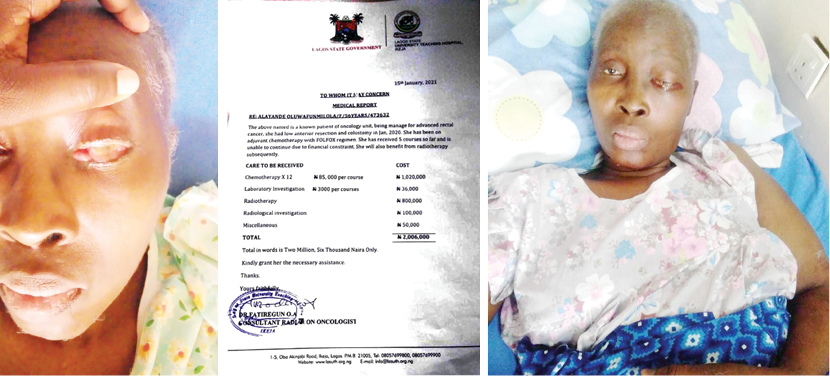Barely one month after the death of her husband in 2019, 57-year-old Mrs Alayande Funmilola Oluwakemi caught a mild stroke.
Oluwakemi’s condition was managed in a private hospital in Lagos State. As if the grief over her husband’s demise was not enough, two days after she was discharged from the hospital, she started noticing blood in her stool and was returned to the health facility.
- Obaseki advocates strong institutions for national development
- Army graduates 67 wounded-in-action soldiers
After attempts to stop the blood failed, the mother of four was transferred to the Lagos State University Teaching Hospital (LASUTH), where she was diagnosed of colorectal cancer.
Christina Chin (MPH), in a review on Medical News Today, described colorectal cancer, also known as bowel cancer, colon cancer or rectal cancer, as any cancer that affects the colon and the rectum.
It is the second leading cause of cancer death in women and the third for men. However, due to advancement in screening techniques and improvements in treatments, the death rate from colorectal cancer has been declining.
Colorectal cancer may be benign, non-cancerous or malignant. A malignant cancer can spread to other parts of the body and damage them.
The American Cancer Society estimates that about one in 21 men and one in 23 women in the Unites States will develop colorectal cancer during their lifetime.
Some of the symptoms of colorectal cancer are changes in bowel habits, diarrhea or constipation, a feeling that the bowel does not empty properly after a bowel movement, blood in faeces that makes stools look black, bright red blood coming from the rectum, pain and bloating in the abdomen and unexplained weight loss, among others.
For two years now, the once agile and hardworking Mrs Alayande has been battling colorectal cancer, as a result of which her business of selling rubber slippers collapsed, while her late husband’s rental business was also abandoned.
Narrating her ordeal, Mrs Alayande said, “At the LASUTH, Ikeja, a series of tests showed I had colorectal cancer.’’
She had a surgery on January 14, 2020 but couldn’t start chemotherapy due to the COVID-19 lockdown, until September 2020. Then she was told that she would undergo 12 sessions of chemotherapy with an estimated medical bill of over N2million.
Footing the medical bill has been a big challenge, but her friends and some of her late husband’s friends have been supporting her financially, which has made her successfully scale through nine of the 12 chemotherapy sessions she is to go through.
“Now, we have exhausted all funds and I still have three more sessions of chemotherapy to go. I do not know where to face for help,’’ she said.
Mrs Alayande ordinarily goes for treatment fortnightly, but she has not returned home since the last time she visited the hospital as she has been bedridden for over a month now. She said she managed to sit on a wheelchair on few occasions when she got strength to rise up from her sleeping position.
She further said that each chemotherapy kept her in the hospital for over three days. She also disclosed that each chemotherapy session, including drugs and admission fee, costs about N150,000.
Apart from the huge sum spent on chemotherapy, Mrs Alayande suffers diarrhea, weakness and bruises under her breasts, armpits and pubic areas after every chemo session as it kills all the cells in the body, so the immune system gets low.
Her eldest child, Oluwaseyi, who just graduated from Yaba College of Technology and stays with her in the hospital, also narrated how her mother caught eye infection while treating cancer.
She said, “Mum was meant to come for her 10th chemotherapy session on February 1, 2021, but after doing her blood test to check if she was fit, the results said her platelet count and white blood cells were low. So, she took five pints of platelets. A day after, she started complaining of headache and her left conjunctival (white part of eye) started swelling.
“The opthalmologist that attended to her said it was infection and placed her on antibiotics. She later met with a consultant and we were told the eye was already ruptured. Her only option was surgery to remove the eye to prevent further infection to the brain and the other eye.’’
At this stage, Mrs Alayande is battling to survive cancer, and at the same time, she is at the verge of losing one of her eyes as she can no longer see with it.
Having undergone nine sessions of chemotherapy, she needs about N500,000 for the remaining three sessions and miscellaneous, which is far from the reach of the patient’s family as they have exhausted all the means open to them.
A medical report issued by LASUTH and signed by the consultant radiation oncologist, Dr Fatiregun O. A, confirmed that Mrs Alayande is a patient of oncology unit of the hospital, being managed for advanced rectal cancer.
The report states that she had low anterior resection and colostomy in January 2020, and that she has been on adjuvant chemotherapy with FOLFOX regimen. It also noted that she had received some courses but unable to continue due to financial constraint.
According to the report, an estimate of care to be received by her, which include 12 courses of chemotherapy, laboratory investigation, radiotherapy, radiological investigation and miscellaneous stands at N2,060,000.
Mrs Alayande seeks help from Nigerians with the wherewithal to support her financially so that she can complete her treatment, as well as eye surgery so as to stay alive.

 Join Daily Trust WhatsApp Community For Quick Access To News and Happenings Around You.
Join Daily Trust WhatsApp Community For Quick Access To News and Happenings Around You.

